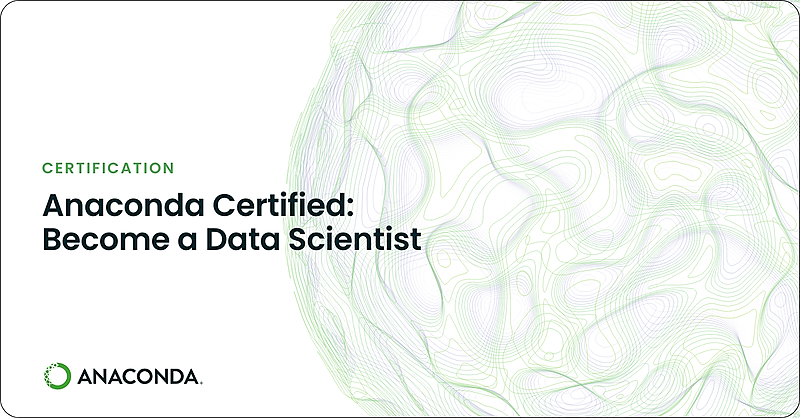-
You’re aspiring to become a data scientist.
-
You’re looking to learn skills, best practices, and strategies needed to launch your data science career.
-
You’re looking to learn skills, best practices, and strategies needed to launch your data science career.
Anaconda Certified: Become a Data Scientist
Gain foundational data science knowledge and practical skills required to develop your career as a data scientist.
By the end of this certification program, you’ll learn:

Python Programming: Practice Quiz
Take this quiz to test your Python knowledge before diving into the rest of the curriculum.
Introduction to Data Science
Explore the role of a data scientist, cross-functional collaboration, and data science applications.
Statistics and Hypothesis Testing
Learn fundamental skills to describe and analyze data with Python.
Become a Data Scientist: Practice Quiz 1
Attempt this practice quiz to test your newly acquired knowledge.
Introduction to pandas for Data Analysis
Building a foundation in Python using pandas dataframes for analysis.
Become a Data Scientist: Practice Quiz 2
Attempt this practice quiz to test your newly acquired knowledge.
Introduction to Data Visualization with Python
Derive insights from data using pandas .plot, Seaborn, and Matplotlib.
Become a Data Scientist: Practice Quiz 3
Attempt this practice quiz to test your newly acquired knowledge.
Introduction to Machine Learning
Get started with fundamental machine learning algorithms using scikit-learn.
Build Your Data Science Portfolio
Best practices and strategies to launch your data science career.
Become a Data Scientist: Practice Quiz 4
Attempt this practice quiz to test your newly acquired knowledge.
Become a Data Scientist
Successfully complete the exam to receive your Become a Data Scientist certificate.
Become Anaconda Certified
Complete all courses and pass the exam to claim your certificate.
This is for you because...
Prerequisites
-
Basic Python proficiency
-
Attempt the "Python Programming: Practice Quiz" to test your Python knowledge.
Thomas Nield
Thomas is the Founder of Nield Consulting Group and Yawman Flight, and an instructor at University of Southern California. He has authored bestselling books, including Essential Math for Data Science (O’Reilly).

Max Humber
Max is a Senior iOS Engineer at National Hockey League (NHL), and the creator of gazpacho, gif, and GRAPHIITE.

Ryan Orsinger
Ryan is the Director of Data Science and Research at Haven for Hope. He previously taught data science and software development at Codeup.

Jose Mesa
Jose is a Staff Software Engineer at Anaconda. He received his Ph.D. from the University of Michigan Naval Architecture and Marine Engineering (NA&ME) department and holds two MSE degrees in Aerospace Engineering and NA&ME.

Sophia Yang
Sophia, a former Sr. Data Scientist at Anaconda, volunteers as a Project Incubator at NumFOCUS. She's the author of multiple Python libraries, and has a Ph.D. in Educational Psychology from University of Texas, Austin.

Frequently Asked Questions
-
What is the expected time to complete the exam?
The exam contains 50 multiple-choice questions. We anticipate you taking approx. 1 minute per question. Therefore, you should be able to attempt all questions within an hour or so. Note that the exam itself is not timed. You will see the following instruction before starting the exam: "The exam should be completed in one session, rather than pausing and resuming."
-
Can I refer to study materials during the exam?
The exam is closed book. Our Exam Instructions explicitly state the following: "This is an individual exam, and collaboration or seeking external assistance is strictly prohibited. / Do not attempt to copy, print, or save any exam questions or materials."
-
Is there a validity period for the certification?
The certification does not have an expiration date. However, the content and practices covered by the certification reflect the latest Python best practices at the time. If there are updates required due to marketing or technical advancements, the certification/product might be retired and/or replaced.
-
Will there be someone monitoring the exam?
No, the exam is not proctored.
-
Can I take the exam from home?
You will take the exam remotely, whenever you're ready, using your own computer or laptop. Our Exam Instructions state the following: "Ensure that you have a stable internet connection throughout the duration of the exam. / Use a desktop or laptop computer for optimal compatibility. Mobile devices and tablets are not recommended."
-
How do I add the certification to my LinkedIn profile?
Once you successfully pass the exam, visit My Certificates. Click on View certificate for this certification program. You will see an option there for sharing your certificate on LinkedIn.

.png)
.png)
.png)
.png)
.png)
.png)
.png)
.png)
.png)
.png)
.png)
.png)
.png)

.png)
.png)

.png)
.png)